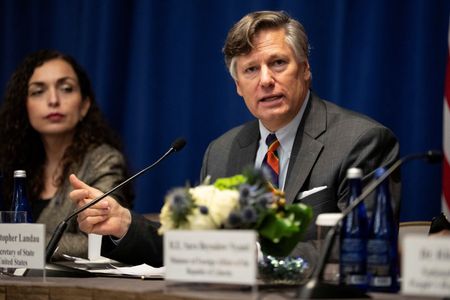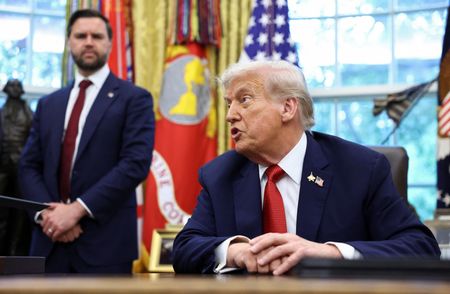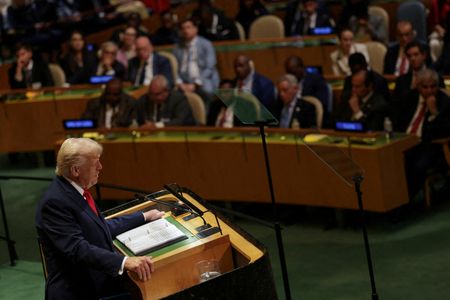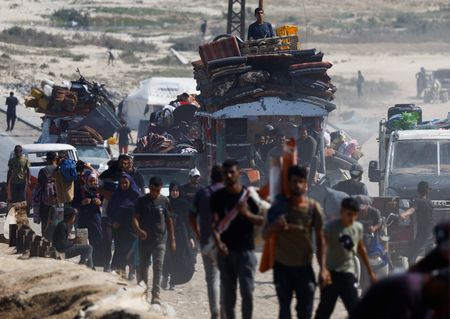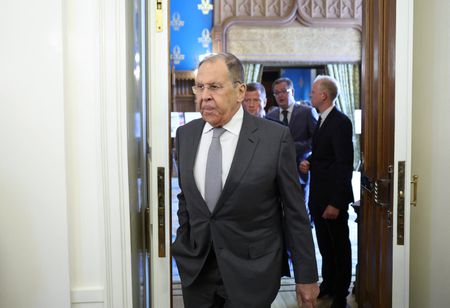By Humeyra Pamuk and Ted Hesson
NEW YORK (Reuters) -Top Trump administration officials urged other nations on Thursday to join a global campaign to roll back asylum protections, a major shift that would seek to reshape the post-World War Two framework around humanitarian migration.
At a side event during the United Nations annual gathering in New York City, U.S. officials said that the existing global asylum system was being exploited by economic migrants and criminal groups seeking to profit from illegal immigration.
Deputy Secretary of State Christopher Landau laid out the U.S. stance, saying migrants should seek asylum in the first country they enter, not a nation of their choosing. He said asylum should be temporary, with the host country deciding when conditions back home had improved enough for their return.
“The asylum system has become a huge loophole in our migration laws,” Landau said. “I think we have to be realistic that these laws are now being abused.”
The proposal – exclusively reported by Reuters earlier this month – would mark a dramatic pivot from how asylum works in the U.S. and elsewhere.
Since taking office in January, President Donald Trump has launched an aggressive immigration crackdown, including revoking humanitarian protections for hundreds of thousands of migrants. The new U.S. principles effectively seek to internationalize his restrictive approach among like-minded governments.
In a combative speech to the U.N. General Assembly on Tuesday, Trump argued for lower levels of global migration and promoted his immigration approach as a model for other countries.
The U.S. was joined at the event by leaders or top officials from Bangladesh, Kosovo, Liberia and Panama. Those officials did not explicitly endorse the U.S. proposals, but expressed openness to changes to global asylum principles.
OUTDATED ASYLUM SYSTEM
Spencer Chretien, a senior U.S. State Department refugee official who opened the event, said that 1951 and 1967 global conventions that form the basis of the modern-day asylum system were outdated. He said the U.S. in coming months would convene nations to draft new global asylum principles.
“This event is not just a conversation, but it’s a call to action,” Chretien said. “We aim to galvanize support for changes to the international refugee and asylum system.”
Chretien, the senior official at the State Department’s Bureau of Population, Refugees, and Migration, is spearheading an effort to bring white South Africans to the U.S. as refugees.
Refugee Council USA, a coalition of U.S. refugee groups, sent a letter to Trump on Wednesday urging him to support the existing global asylum accords.
“Any attempt to withdraw from or circumvent international and domestic refugee law undermines U.S. global leadership and our respect for the rule of law,” the group said. Citing U.N. statistics, it said that 2.5 million refugees would need resettlement in the coming year but that only a fraction would be resettled.
Kosovo’s President Vjosa Osmani said she supported “new, swifter and more agile legal frameworks” around asylum to prevent abuse of the system.
“It must be our democratic right to decide who enters our countries and who enters our borders,” she said.
Filippo Grandi, the U.N. high commissioner for refugees, was in the audience and offered support for the existing global asylum system, saying the fundamental principles remain valid.
“Asylum is a very ancient concept,” he said. “It’s not something we have invented in the past 80 years. It’s in all cultures and in all religions, because it is recognized as a life-saving instrument.”
(Reporting by Humeyra Pamuk in New York and Ted Hesson in Washington; Editing by Don Durfee and Howard Goller)

